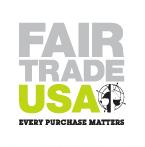Wednesday night when I walked into the conference room for the most recent St. Louis Jewish Environmental Initiative general meeting a tantalizing surprise met me: a table full of decadent fair trade chocolate desserts!
The night’s guest, Andrea Reubin of Just Sweets dessertery based in St. Louis, visited to discuss her efforts to make tasty deserts more humanity friendly by using Fair Trade Certified ingredients in her desserts and by selling them online nationwide.
“My story is simple: I love dessert but it has to be worth it!” Reubin said, explaining her philosophy of using only top-notch ingredients, as many local as possible, and, first and foremost, for all ingredients produced in developing countries to be Fair Trade Certified. Fair Trade Certified ingredients, she said, translate into living wages that provide food, shelter, clean water, good health, education and the building strong, successful families.
Each of Just Sweets’ desserts have a Fair Trade story, too, detailed on both the website and in a fashionable dessert lookbook. Each ingredient follows each story with each Fair Trade Certified and organic ingredient labeled.
The Just Sweets’s luxurious desserts I sampled and recommend:
 What is Fair Trade?
What is Fair Trade?
Fair Trade USA in the independent, third-party certifier of Fair Trade products in the U.S. Their requirements for becoming Fair Trade Certified revolve around six principles:
- Fair price and credit
- Fair labor conditions
- Direct trade
- Democratic and transparent organizations
- Community development
- Environmental sustainability
- Protecting water resources and natural vegetation areas
- Promoting agricultural diversification, erosion control, and no slash and burn
- Restricting the use of pesticides and fertilizers
- Banning use of genetically modified organisms (GMOs)
- Requiring proper management of waste, water and energy
- Fair Trade also promotes organic farming with training for producers and a higher price for organic products. Many producers invest their Fair Trade premium funds in organic certification, which has led to outstanding results: more than half (62%) of all Fair Trade products in the United States were also organic.
Discussion Question
What Fair Trade items do you buy, and is it important to you?
Sources
Just Sweets : The Fair Trade Movement pdf



